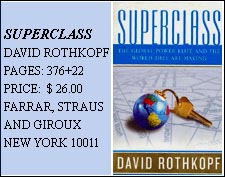 It is interesting to learn that there are only 6,000 people (approximately) who decide the fate of the humanity. This rather arbitrary figure shows that there is one individual in every million who is a member of this “Superclass”.
It is interesting to learn that there are only 6,000 people (approximately) who decide the fate of the humanity. This rather arbitrary figure shows that there is one individual in every million who is a member of this “Superclass”.There is no single, formal club of the super powerful 6,000, nor is there anything put in black and white about the rules of membership. Older members move out of the circle, which allows new ones to move in comfortably as the numbers remain virtually the same.
David Rothkopf adds that there are quite a few who remain in the club for decades. One such person is former US Secretary of State Henry Kissinger, who worked in the administration of President Richard Nixon.
This top bracket of the human species mostly knows each other. They know each other in their shared fields of specialisation as well as in allied fields. Most things in life are in any case interconnected. Thus it is quite natural for them to know counterparts from various fields. That works out to a huge number of people the individual from the Superclass knows as peers.
The Superclass comes from many fields: politics, industry, banking and financial services, armed forces, religion, cinema, writing and other arts. On one hand the hard power of the military and finance work to force the world to move as the Superclass wills, the soft power of cinema, writing and other arts facilitates this process. Religion, too, has the power to deeply influence human behaviour and chart a way of life for large sections of people.
There are writers whose books sell in their millions, thus potentially influencing so many people and helping shape their world view. Naturally, such writers are part of the global Superclass. Likewise, powerful politicians, military leaders, bankers and financiers have the same power. Among the Superclass coming from religion are the Pope, the late Iranian leader Ayatollah Rohullah Khomeini and the present Iranian supreme leader Ayatollah Khamnaei.
This Superclass is so powerful that there can be no war if it does not want one. Naturally, there would be no peace if this class does not want it. The world’s biggest wars have been fought (and millions of lives lost) basically to protect the interests of these people. Countries make laws to suit the purposes of this powerful class although in democracies politicians are voted to power by common people.
The Superclass has wielded extraordinary powers over the decades and centuries. One example of absolute power has been the Rothschild family whose power has endured for quite a few centuries. Gutle Schnaper, wife of Mayer Amschel Rothschild, is said to have stated before her death in 1849, “If my sons did not want wars, there would be none”. (This remark does not figure in the book).
To influence the policies of countries, this global Superclass utilises the media, national chambers of commerce of different countries, religious organisations, NGOs, economic and financial experts, military officials, and defence experts and specialised lobbies. Besides these, important bureaucrats, central bank and reserve bank officials as well as leaders of financial institutions and trade unions are deployed to attain the objectives of the Superclass. Quite often the top echelons of these groups are themselves part of the Superclass.
The Superclass not only controls the levers of power within countries, but also manages international institutions and world affairs. The CEOs of many multinational companies are part of this global elite. Indian industrialists Ratan Tata and Mukesh Ambani have been described as members of this group. Tata is on the board of American companies, while Ambani, too, is part of this network of powerful individuals. Most of this class meets each other at for a like World Trade Organisation, World Economic Forum, G-2, G-7, G-8, G-20 and ASEAN to name a few. World leaders meet at these fora several times a year.
Rothkopf describes how CEOs of different US companies go on to become cabinet ministers in the US federal and state governments. They also come back to join as CEOs of such companies after their term as ministers (secretaries) is over. That further boosts their influence both in government and industry. This group functions in an environment where the laws are made by national parliaments and nations enjoy sovereign rights, but the sweep of this class transcends national boundaries and impinges on the sovereignty of nation states. That is an anomalous situation.
By its very nature this class is global and thrives in a globalising environment. However, international institutions like the UN, World Bank, IMF and others are losing credibility and clout. Thus they have a limited manoeuvre room, legally speaking. Then, there are a host of powerful political leaders like Castro, Chavez, Lulu, Ortega and Ahmedinejad who are opposed to globalisation, which they see as Western, neo-imperial agenda.
Rothkopf questions the ethics and legitimacy of such power (financial, political, diplomatic, religious and military) being confined to such a small elite. All said and done, one feels the web of power is more complex and its hidden agenda more sinister than is portrayed in this 376+22-page book. And yes, this book is fast-moving, riveting and unputdownable. g